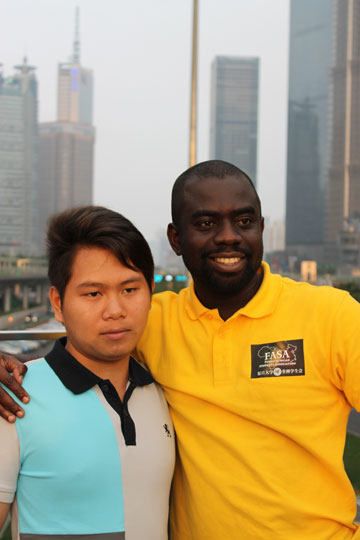Grateful to China


I visited China for the first time in 2008. I was fascinated by the developments in the country. Coming from an African nation with many development challenges, I marveled at how China had overcome serious to attain such an impressive growth.
Dream destination
My Chinese was next to zero. Take “ni hao” out and I was helpless. To me Mandarin was too complex for human comprehension. How human beings managed to bring meaning to all the thousands of Chinese characters and keep them in mind was baffling. And even more baffling was the dexterity with which people ate with chopsticks. But China still held a strong attraction for me. I began to dream a future in China. My first trip to China was a pretty short one – just about five days. I was part of a team of journalists that had gone to do some news coverage for a Chinese company establishing footprints in Africa.
Two years later, I was asked by one of my bosses whether I wanted to study in China. There was an opportunity for academic studies under a Chinese government scholarship program and the company I was working for was considering nominating me. I willingly and excitedly said yes. China was a dream destination.
One of the universities I chose was Fudan. I had read about Fudan and its reputation was legendary. It was a top choice for me.
‘Positive discrimination’
In 2010, I had another opportunity to visit China. Again I was part of a team of journalists that had visited China for media coverage on the invitation of an organization in China. My second visit provided a memorable experience. I had always noticed the interest some Chinese nationals had in Africans or for that matter black people. On many occasions I had been politely asked by Chinese nationals for photo opportunities and I always obliged. I felt like a celebrity. But this experience I am about to recount had a more profound effect on me. It was on the last day of our visit and I had gone to a shop with a few white ladies. Beijing was wet with rain and many commuters were at the bus stops waiting for taxis or buses.
The white ladies had left me at the shop and rushed to the roadside as we all hurried with final preparations for our flight that night. To my surprise when I got to the roadside they were still waiting for a taxi to our hotel. It was rush hour and with the rain, getting a taxi was a bit challenging.
I joined my colleagues by the roadside. The look on their faces was dull but pointed; it was around 6pm and our flight was 12 midnight. Just as we mused over our options, a taxi emerged and as it slowed down my gaze caught the driver’s. But we were more than a sprint late. When he finally stopped, his car was already surrounded by some commuters. And just when we had about given up on this particular taxi because it was already surrounded by aggressive commuters seeking an entry, I saw the driver signal to them that he wanted to pick me. I was surprised; for me it was “positive discrimination”. My white colleagues were excited; they adored me instantly. We had “beaten” the other commuters because I was black!
That night, I left China with warm feelings; not only because of that encounter but also because I had received an email from Fudan during the visit that I had been admitted for the PhD program in communication. In a matter of weeks, I would be returning to China to commence studies.
‘Broken Chinese’
I was supposed to study Chinese for one academic year and then proceed with the doctoral program in Fudan. Nanjing was a real “Baptism of Mandarin”. At the Nanjing Normal University, the Chinese lessons were intense; “In three months you will be speaking broken Chinese” one tutor told my class. In three months, I could speak broken Chinese with my friend Reuben from Equatorial Guinea. Reuben did not speak English and I spoke neither French nor Spanish. On many occasions, we had been restricted to gestures, pointing to items or getting friends to interpret in our communication. When our “Broken Chinese” arrived it was such a relief to me. In Mandarin, the two of us had a unifying language and we could now communicate better.
One Chinese friend who was very helpful during my studies in China was Sarah, a Chinese lady who was my language partner. Sarah was so helpful with my Chinese language and invited me out a couple of times. On one occasion, I joined her mother and boyfriend for lunch and enjoyed it. At this point in time, I had gotten used to Chinese food and really enjoyed the meals. I could also use the chopsticks appreciably well.
Just after six months we sat for the HSK Level 4 exams and many of us passed. Passing the HSK meant I was on course to commence my major program at Fudan. But my Chinese was still not to the level I wanted and visiting Ghana for summer holidays that year affected my fluency. I returned from Ghana stuttering in Chinese and drawing some concern from one Chinese friend, who told me quite bluntly, “I think you have to improve your Chinese”. It was obvious I had to push myself harder. I was studying in Chinese and I pushed myself harder.
But it is a story that ended well. I graduated from Fudan University with a Doctor of Literature degree in Communication and today I am a university lecturer and media consultant in Ghana. I am eternally grateful to China. And thank you China for the opportunity.
Daniel Nkrumah is a communication lecturer and the public relations manager at the Pentecost University College in Accra, Ghana.


































